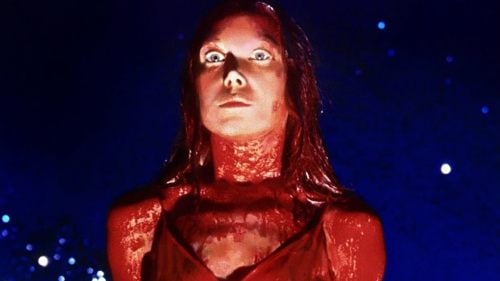Fantastic Fest Review: GERALD’S GAME Is The Quintessential Stephen King Adaptation
Adapting Stephen King is tricky, despite his blunt blue-collar prose lending itself to simple visualization. He’s an author whose worldview often clashes with his idealistic intentions – just look to the murder of Adrian Mellon at the beginning of IT for possibly the best example (where King confronts 80s AIDS crisis homophobia while still liberally using the word “faggot”). But the purity of said intent can be transfigured into worthy pieces of pop art in the right cinematic hands. Such is the case with Mike Flanagan’s (Hush) adaptation of the horror maestro’s ’92 “adult thriller”, Gerald’s Game. Combining many of the novelist’s guttural fetishes (and even going as far as to toss in a Dark Tower reference for good measure), Flanagan has not only concocted the quintessential King picture, but also a moral interrogation regarding the consequences of sexual assault that is all too timely.
Jessie (Carla Gugino) and her husband Gerald (Bruce Greenwood) are headed to their secluded, lakeside Maine cabin to try and rekindle some passion in their fading marriage. An hour after arriving, Jessie slides into a slip, and her man pops a Viagra before handcuffing her to the bed and putting a hand around Jessie’s throat. It seems Gerald hasn’t been able to get it up with his better half for quite some time, until he recently got caught up in the moment and realized that rough sex and rape fantasies were his true turn-ons. Jessie resists, and while the two consequently talk divorce, Gerald clutches his chest and keels over from a heart attack, leaving his new widow chained to the headboard. Now, there’s no escaping this boudoir prison chamber, and a hungry dog they met on the road comes calling to nibble on Gerald’s fresh corpse.
Before we go any further, something needs to be acknowledged: Gerald’s Game is a movie about sexual assault. Furthermore, it’s a Stephen King movie about sexual assault. If that make you uncomfortable, know you’re not alone. King has never been a subtle storyteller, and Flanagan embraces his bullheaded approach to the topic as Jessie descends into hallucinatory madness, her own psyche coming alive to question her about not only her relationship with Gerald, but also a past moment of abuse at the hands of her father (Henry Thomas; truly genius subversive casting). Once Gerald also rises from the dead and the three (Living Jessie, Perceptive Jessie, and Undead Gerry) begin a moral inquisition regarding the nature of consent, marriage difficulties, and how past trauma can inform your present choice in partners, the movie never lets its source off the hook.
But that’s what marks Flanagan’s film as such a brilliant adaptation: it allows the characters to come alive as King envisioned them, but also acknowledges that some of his choices are pigheadedly weird, and lets his actors take those problematic character choices and transmute them into shades of ethical greyness any human being could possess. It’s a beautiful example of cinema transcending its written foundation, using the tools of the trade to metamorphose into something higher (in this case unbelievable turns by both Gugino and Greenwood, under the guidance of a director fully in control of his craft). All the while, Flanagan never forgets that he’s still making a horror picture, and shocks us with a flesh-eating stray, plus a manifestation of Death Himself (the infamous “Space Cowboy” from the novel, played by Twin Peaks giant Carel Struycken), which comes to visit Jessie and beckons her to enter the beyond. It’s a delicate balancing act between reflexive criticism and fidelity, never sacrificing one for the other.
There’s a staginess to the way Flanagan envisions this (mostly) single location thriller scenario, where we’re watching better angels combat nefarious devils right in front of Jessie’s eyes. The director’s regular DP, Michael Fimognari (Oculus) lenses the chamber with an eye for space, keeping it intimate while never feeling cramped, visually (extra props to production designer Patrick M. Sullivan Jr. for getting the frills of this bougie vacation home’s interior just right). Though with a handful of carefully placed edits (courtesy of Flanagan again), we never feel like we’re watching a filmed play, but rather a precise work of moviemaking craft. When the flashbacks are added in (taking place during a haunting solar eclipse, recalling King’s Dolores Claiborne, which was also released by Viking in ’92) and one gut wrenching instance of extreme gore, Gerald’s Game becomes a fully realized work of affecting horror, that takes its time to let the performers work to define these complicated individuals.
There will be some who take issue with the ending of Gerald’s Game, which is lifted pretty much verbatim (sans a few distinct alterations) from the novel. As has been noted time and again, King is rarely an ace at bringing his stories in for the landing. In fact, he’s sucked at it for most of his historic career. Gerald’s Game is no different. But the hand-written epilogue’s expositional bump in the road is forgivable because the message the movie delivers is one that’s both thematically sound and chokingly tender. This is a film about confronting your own pain and abuse, and drawing strength from the psychic wounds its left you with, while reaching out to others who have endured similar trauma and letting them know they’re not alone. For all of its hellish carnal imagery, guttural monologues, and self-inflicted butchery, Gerald’s Game is ultimately a story about hope – hope that not all is lost in the face of destructive male sexuality. Jessie is an avatar for the reclamation of feminine self, and a rejection of forced silence in the name of love and devotion. Pulp fiction needs this sort of righteous piety right now.



